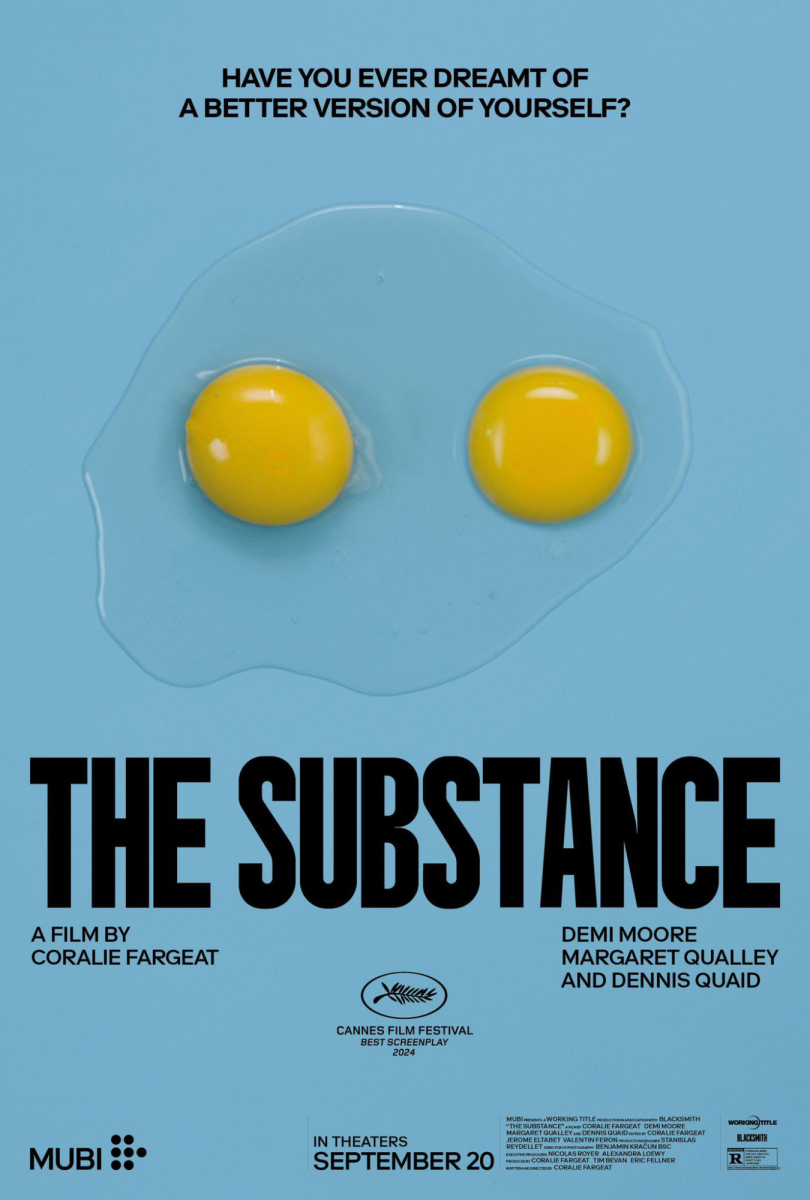Do not let the Margaret Qualley “brat” edits fool you—“The Substance” isn’t pretty. Following an aging Hollywood star and the lengths she will go to to stay in the spotlight, director Coralie Fargeat’s satirical body horror pulls no punches in its grotesquely unflinching examination of beauty standards and Hollywood’s obsession with youth.
Beginning with the fiftieth birthday of Elisabeth Sparkle, an Academy Award-winning actress and television personality (played brilliantly by Demi Moore), the film sees Elisabeth turn to extreme measures after an unnamed television network cancels her long-running aerobics show in hopes of finding a younger, more beautiful host.
Receiving a tip from a young nurse, Elisabeth encounters the Substance, a mystery liquid purported to create a more perfect version of yourself. The catch? You’ll have to alternate every seven days, spending one week as your original self, and the next as your other self. It’s a fairly novel premise, and one which Fargeat pushes to the extreme.
Desperately hoping to cling on to her youth and fame, Elisabeth injects herself with the sickly green fluid. Enter Sue (Margaret Qualley), Elisabeth’s Other Self. Emerging from Elisabeth’s back in a Cronenberg-esque display of body horror, Sue slowly begins to assume Elisabeth’s old life, landing the host job, rising to national stardom and circumventing the seven-day rule. As Sue continues to push against rules of the Substance, Elisabeth’s mental and physical state deteriorates, plunging the film further into chaos.
The film does not care much for subtlety—Dennis Quaid plays a predatory executive named Harvey, for example—but the on-the-nose nature mostly aids its tone and message, if not leads the film to occasional overindulgence. Hollywood has long suffered from girlboss films, movies whose feminist musings don’t dare to go much further than “women are cool, too, I guess!” “The Substance” barrels past any sort of convention, unapologetically brandishing its feminism in the audience’s face.
Rather than chip away at an undeniably gendered topic of beauty standards and ageism with an ice pick, “The Substance” uses a hammer. Yes, a massive billboard of Sue stares directly into Elisabeth’s apartment, and yes, Harvey sings to Sue that “pretty girls should always smile!” while surrounded by a throng of balding executives practically salivating over her, because there is no room for subtlety when satirizing something as culturally pervasive as our harmful metrics of beauty.
In leaving subtlety behind, the film walks a fine line. As it detaches further from reality, it bleeds into somewhat superfluous territory. The final 15 minutes feel less like a witty satire and more like a gratuitous grindhouse flick. Still, there’s no denying that its in-your-face style makes for a wholly unique experience. Fargeat’s abandonment of subtlety leaves you with a writhing, technicolor fever dream that slaps you across the face and doesn’t give you much time to catch your breath, which you will find yourself trying to do quite often as you watch.
Few words describe “The Substance” better than “gross.” Blood, guts and Dennis Quaid devouring shrimp, oh my! The horror elements are nothing short of nauseating; every repulsive side effect of the Substance on Elisabeth and Sue’s bodies is on full display.
Fargeat and director of photography Benjamin Kracun utilize every inch of the screen to create a dynamic visual language for the whirlwind 141-minute runtime. Even when taking a break from the gore, the film’s visuals give off a consistently unsettling feeling. Nearly perfectly symmetrical shots are ever so slightly slanted, characters find themselves in hallways and sterile white rooms reminiscent of Kubrick’s “The Shining” and “2001” and actors’ entire faces get cut out of frame, staring at the audience with one bug-eye. Moore, Qualley and Quaid are unafraid to get ugly, with Moore especially diving headfirst into the slop.
Moore, almost parodying her public image as an American beauty icon, brings a crucial depth to Elisabeth. She seamlessly transitions from restrained self-consciousness to animalistic rage to pitiful terror. Rarely do you see a female horror protagonist with Elisabeth’s nuance, for which you can thank both Moore’s performance and Fargeat’s screenplay.
“The Substance” took home Best Screenplay at this year’s Cannes Film Festival, and for good reason. Nearly every line drips with a slimy humor and wryness. Still, the writing does not feel suffocatingly biting.
Towards the end, as the Substance renders Elisabeth an unrecognizable version of her original form, the screenplay treats her transformation with a tenderness uncharacteristic of an otherwise forward and flashy film. The film portrays Elisabeth not as a hideous monster meant only to incite fear, but as a victim of a society that tosses women to the side the second they hit middle age. It’s a tragic moment, and a refreshing pivot away from the hagsploitation that so plagues the horror genre.
Fargeat’s writing takes what could have easily been a trite and derivative slog through surface-level social commentary and creates a boldness that makes the film so different. Its originality, while occasionally dipping into overindulgence, creates the foundation for an audacious, sickeningly wonderful body horror epic.
4/5 stars
“The Substance” is rated R for graphic content, violence, and strong language.
This story was originally published on The Review on October 22, 2024.







































